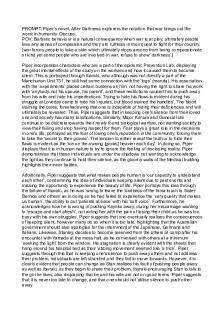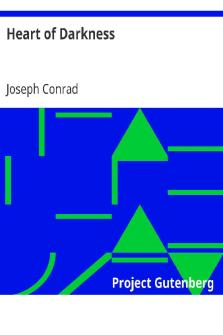After darkness essay pdf PDF

| Title | After darkness essay pdf |
|---|---|
| Author | free psplus |
| Course | english |
| Institution | Hillcrest Christian College |
| Pages | 2 |
| File Size | 53.8 KB |
| File Type | |
| Total Downloads | 77 |
| Total Views | 169 |
Summary
good notes...
Description
PROMPT: Piper’s novel, After Darkness explorers the notation that war brings out the worst in humanity. Discuss. POV: Barbaric behaviour is a natural consequence when war is at play; ultimately people lose any sense of compassion and they are ruthless in their quest to fight for their country. {war forces people to take a side which ultimately stops anyone from being compassionate or kind yet some people who are involved in war, refuse to show ‘darkness’.] Piper incorporates characters who are a part of the epidemic Prevention Lab, displaying the great mental effects of the study on the workers and how it caused them to become silent. This is portrayed through Ibaraki, who although was not directly a part of the Manchurian Unit 731, he still had some connection with the ‘logs’ (maruta). His association with the ‘experiments’ placed certain burdens on him, not having the right to share his work with ‘anybody-not his spouse, his parent’, and these restrictions caused him to push away from his wife and hide his imperfections. Trying to hide his flaws is evident during his struggle at Loveday camp to hide his ‘injuries, but blood stained the handles’. The blood staining the poles, foreshadowing that one is incapable of hiding their deficiencies and will ultimately be revealed. Thus, Piper suggests that in keeping one's silence from their loved one and society has many ramifications. Similarly, Major Kimura and General Ishii continue to be discrete towards their newly found biological warfare, not wanting society to view their failing and stop having respect for them. Fear plays a great role in the decisions in one's life, portrayed as the fear of losing one's reputation in the community, forcing them to take the ‘secret to their graves’. The tension to either reveal the truth or to hide their flaws is evident as the ‘ice on the awning [grows] heavier each day’. In doing so, Piper displays that it is in human nature to try to ignore the feeling of disclosing reality. Piper demonstrates that these individuals are under the shadows not wanting to acknowledge the light as they continue to hold their silence, as the gloomy walls of the Medical building highlights their inner battles. Additionally, Piper suggests that what makes people human is ‘our capacity to understand each other’, condemning the idea of individuals keeping silent due to past events and missing the opportunity to experience the beauty of life. Piper portrays this idea through the failure of Ibaraki, as he was ‘wrong to leave the kindness of the hima touch to Sister Bernice and others’ as in doing so he had failed to experience the ‘very quality that makes us human’, the ability to put ‘patients at ease’ with his ‘soft voice’. Furthermore, he acknowledges how he is wrong in pushing Kayoko away, during her miscarriage wanting to ‘escape and start afresh’, not aiding her with the pain of losing their child as he was too busy with his own struggles. Piper suggests that one eventually realises the consequences of keeping silent, however many do so when it is too late, highlighting that the Australian government should also apologise for the internment of the Japanese, Germans and Italians. Likewise, Stanley, decides to become reserved from the others at camp after his encounter with Yamada at the mess hall, as he conversed with others at a minimum ‘seeking the light’ from the window. His stagnation is clearly evident with the sheets that hang around his hospital bed as their ‘ebbing movement’ seemed like ‘a trick’. Piper suggests through this that in keeping one's silence to push away others and not address their problem, individuals are left stranded and they fail to move forwards. However, it is clearly evident that people can change as Stan realises his fault of pushing people away as well as Ibaraki, as they begin to share their problem, Ibaraki encouraging Stan to talk to the girl he likes, also displaying that he and his wife are not on good terms. Piper suggests that it is never too late to change, and that one should not utilise silence to push other away.
On the contrary, Piper presents characters who prefer to voice out their thoughts and share their experiences rather than staying silent. This is observed through Kayoko who stands up for the girls on “Setsubun”, saying that the ‘girls mean no harm’. Their role reversal is clearly noticeable, as Ibaraki does not have the confidence to go up to the guards and do the same, as Setsubun, is when the ‘world is placed into disarray and role reversal’ between the men and women takes place. However, Ibaraki notices that Kayoko is ‘fragile’. Piper highlights that although one may be weak, it is extremely important to take a stand and speak up. Moreover, through Ibaraki’s journey, Bernice also displays the significance of voicing one's thoughts. This is observed when she asks Ibaraki about the ‘wooden tag, with ku’ on it, questioning why she doesn’t know much about Ibaraki, even though they ‘see each other almost every day’. Bernice’s characteristic of ‘conversing [with her] patients’ is a sense of hope for her, in an isolated place like Broome. Hope is greatly required for individuals to live life to their fullest capacity, and the boab tree they pass by on their nighty walk, symbolises the idea that god is looking over everyone no matter where they may be; reinforcing a sense of hope. Through Bernice, Piper successfully displays the importance of speaking up and addressing the conflicts that arise in one's life, and the failure to do so will consequently result in devastating consequences. The importance to speak up for one's rights is also demonstrated through Johnny, who at camp feels as though he is being treated unfairly, continuously airing his problems. Being called a ‘Chinese bastard’ and enduring other racial remarks, Johnny says that Yamada is making them ‘do all the crap jobs’. Consequently running away from camp, highlighting how some individuals take extreme measures to stand up against the injustices. Piper, emphasises to her readers, the importance of voicing their thoughts at appropriate moments, as Stanley is placed in juxtaposition to Johnny and due to his failure to speak up he ends up dead. Through the non-fictional event in the fictional novel ‘After Darkness’ Piper alludes to the idea that individuals cannot discard their past and must acknowledge and learn from them, highlighting that negative experiences one has encountered in the past, control how one conducts themselves, utilising silence to hide their flaws, as well as push others away. However, it is also apparent that not all people utilise silence in a negative manner but prefer to speak up....
Similar Free PDFs

After darkness essay pdf
- 2 Pages

After darkness study guides
- 13 Pages

After Darkness Themes + Quotes
- 5 Pages

Heart of darkness
- 4 Pages

Heart of Darkness Reading
- 42 Pages

Heart of darkness español
- 121 Pages

Heart-of-Darkness - books
- 88 Pages

Heart of darkness summary
- 8 Pages

Narrative Essay PDF
- 7 Pages

Ethics presentation essay pdf
- 8 Pages

After Life
- 1 Pages
Popular Institutions
- Tinajero National High School - Annex
- Politeknik Caltex Riau
- Yokohama City University
- SGT University
- University of Al-Qadisiyah
- Divine Word College of Vigan
- Techniek College Rotterdam
- Universidade de Santiago
- Universiti Teknologi MARA Cawangan Johor Kampus Pasir Gudang
- Poltekkes Kemenkes Yogyakarta
- Baguio City National High School
- Colegio san marcos
- preparatoria uno
- Centro de Bachillerato Tecnológico Industrial y de Servicios No. 107
- Dalian Maritime University
- Quang Trung Secondary School
- Colegio Tecnológico en Informática
- Corporación Regional de Educación Superior
- Grupo CEDVA
- Dar Al Uloom University
- Centro de Estudios Preuniversitarios de la Universidad Nacional de Ingeniería
- 上智大学
- Aakash International School, Nuna Majara
- San Felipe Neri Catholic School
- Kang Chiao International School - New Taipei City
- Misamis Occidental National High School
- Institución Educativa Escuela Normal Juan Ladrilleros
- Kolehiyo ng Pantukan
- Batanes State College
- Instituto Continental
- Sekolah Menengah Kejuruan Kesehatan Kaltara (Tarakan)
- Colegio de La Inmaculada Concepcion - Cebu




